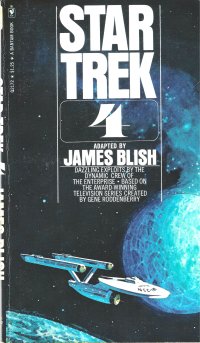 As I mentioned when I recently went over Star Trek 3 that Blish, in his introduction, talks about how they decide which Star Trek episodes to include in each volume–basically, they’re going on fan requests, volume thereof. By the time this book comes out (1971), Star Trek has been off the air for a couple of years–by the time this printing occurs, it’s longer still (and man is about to or has just landed on another piece of the solar system for the last time). So they must have known or thought this might be a phenomenon. Whether they could even conceive then that it would lead to multiple television series and movie reboots fifty years later…. You know, probably not. That’s a long time in the future from 1971.
As I mentioned when I recently went over Star Trek 3 that Blish, in his introduction, talks about how they decide which Star Trek episodes to include in each volume–basically, they’re going on fan requests, volume thereof. By the time this book comes out (1971), Star Trek has been off the air for a couple of years–by the time this printing occurs, it’s longer still (and man is about to or has just landed on another piece of the solar system for the last time). So they must have known or thought this might be a phenomenon. Whether they could even conceive then that it would lead to multiple television series and movie reboots fifty years later…. You know, probably not. That’s a long time in the future from 1971.
At any rate, this book collects some more episodes I remember. Previously, I called these iconic, but basically, it’s episodes I remember. Perhaps they’re iconic. Perhaps I just watched Star Trek a lot. I mean, I remember watching it on the little color television in my mother’s bedroom in the house down the gravel road in 1988 or so. Why was I watching it there? The 25″ television was in the living room. Perhaps the smaller television had better antennae, or perhaps I was grounded.
The episodes within include:
- “All Our Yesterdays”, the one where they go back in time. Well, separately–Kirk, Spock, and McCoy get beamed to a planet where the population has all beamed into the past to avoid a catastrophe. A “librarian” still manning the device thinks the Enterprise team are stragglers, and he beams them into two different eras of the past separately–so the Enterprise crew needs to get themselves back to the present time.
- “The Devil in the Dark”, the one with the Horta, with which Spock mind-melds and cries, “Pain! Pain!”
- “Journey to Babel”, the one with Spock’s parents. Also, a plot, and Spock has to save Sarek.
- “The Menagerie”, the one with Captain Pike. Originally shot as the show’s pilot, it was later aired with a framing story–the retelling here leaves out the framing story of Spock mutining to take the disabled Captain Pike back to the planet of the illusionists.
- “The Enterprise Incident”, the one where the Enterprise enters Romulan space, and Kirk goes on trial for espionage.
- “A Piece of the Action”, the one where Kirk and the Enterprise crew act like mobsters. Not a time travel episode as one would expect–they just visit a planet whose cultural development was based on a mob history from an Earth ship’s crash.
So I’m not remembering these episodes quite as clearly, but it’s been thirty years since I have watched Star Trek.
The books have made me want to acquire Star Trek on physical media. I know I’ve seen videocassettes of the series at a local thrift store. Last week, I hit the local antique mall with my Christmas gift certificates (which I can only use until June since they have six month expiration dates), and one of the things I had my eyes out for was such videocassettes. I thought I hit pay dirt at one booth with a shelf of 20 or 30 videocassettes, but they were Star Trek: The Next Generation. As I have the first two seasons on DVD, I was surprised to see that Paramount sold TNG two episodes to a VHS tape–it must have been early in the show’s run. So no Star Trek for my video shelves at this time, which is just as well as I have only watched a couple episodes of the first season of The Twilight Zone on the DVD set that I got not long after reading The Twilight Zone Encyclopedia.
Also, I should note that the next couple of books–Star Trek 5-7, Star Trek 9-10–I have read relatively recently (2005), so my remembering the episodes might just as well be my remembering reading the stories. Although, as I mentioned, I read a great number of these books in middle school or high school, so one cannot expect any of them to be truly green field. Although they are quick enough reads.



1 thought on “Book Report: Star Trek 4 by James Blish (1971, 1975)”
Comments are closed.